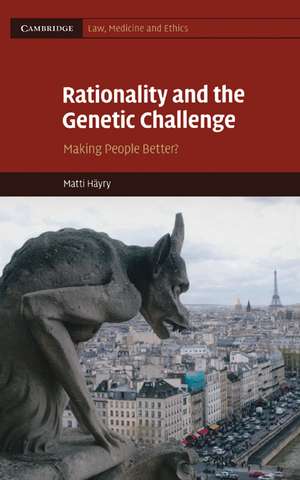Rationality and the Genetic Challenge: Making People Better?: Cambridge Law, Medicine and Ethics, cartea 11
Autor Matti Häyryen Limba Engleză Hardback – 10 feb 2010
Preț: 485.65 lei
Preț vechi: 545.67 lei
-11% Nou
Puncte Express: 728
Preț estimativ în valută:
92.93€ • 99.37$ • 77.48£
92.93€ • 99.37$ • 77.48£
Carte tipărită la comandă
Livrare economică 18 aprilie-02 mai
Preluare comenzi: 021 569.72.76
Specificații
ISBN-13: 9780521763363
ISBN-10: 0521763363
Pagini: 286
Dimensiuni: 152 x 229 x 21 mm
Greutate: 0.62 kg
Editura: Cambridge University Press
Colecția Cambridge University Press
Seria Cambridge Law, Medicine and Ethics
Locul publicării:Cambridge, United Kingdom
ISBN-10: 0521763363
Pagini: 286
Dimensiuni: 152 x 229 x 21 mm
Greutate: 0.62 kg
Editura: Cambridge University Press
Colecția Cambridge University Press
Seria Cambridge Law, Medicine and Ethics
Locul publicării:Cambridge, United Kingdom
Cuprins
1. Seven ways of making people better; 2. Rational approaches to the genetic challenge; 3. The best babies and parental responsibility; 4. Deaf embryos, morality, and the law; 5. Saviour siblings and treating people as a means; 6. Reproductive cloning and designing human beings; 7. Embryonic stem cells, vulnerability, and sanctity; 8. Gene therapies, hopes, and fears; 9. Considerable life extension and the meaning of life; 10. Taking the genetic challenge rationally.
Recenzii
'Häyry gives us a masterful topography and analysis of the philosophical and ethical questions raised by attempts to 'make better future people and to make existing people better.' Anyone who is interested in the challenges posed by genetics (and who wouldn't be?) - from educated lay persons to professionals in the field - will find this a must read by one of today's most outstanding philosophers.' Thomasine Kushner, University of California, Berkeley
'Hayry's book will be incredibly useful for those who are baffled by the complex, contentious, and at times confused discussions of genetic issues; for those deeply immersed in these discussions, it provides a model for a respectful, reflective, yet critical discussion, which is increasingly hard to find in the field of bioethics. The underlying theme of the work presents a remarkable message for bioethicists and the public at large, namely that the rancor and contention that is a hallmark of so much debate would be better replaced with the kind of Colleridgean 'disinterested interest' to allow the issues to be more rationally assessed. In this regard, the book might well be read not only for the ethical issues in the new genetics, but for the underlying methodological approach. Since either the treatment of the genetic challenge or the methodological approach to complex bioethical issues is worth the price of this volume, this book should be read with alacrity.' George J. Agich, Bowling Green State University
'Hayry's book will be incredibly useful for those who are baffled by the complex, contentious, and at times confused discussions of genetic issues; for those deeply immersed in these discussions, it provides a model for a respectful, reflective, yet critical discussion, which is increasingly hard to find in the field of bioethics. The underlying theme of the work presents a remarkable message for bioethicists and the public at large, namely that the rancor and contention that is a hallmark of so much debate would be better replaced with the kind of Colleridgean 'disinterested interest' to allow the issues to be more rationally assessed. In this regard, the book might well be read not only for the ethical issues in the new genetics, but for the underlying methodological approach. Since either the treatment of the genetic challenge or the methodological approach to complex bioethical issues is worth the price of this volume, this book should be read with alacrity.' George J. Agich, Bowling Green State University
Notă biografică
Descriere
Matti Häyry asks if we should make people healthier, smarter, and longer-lived if genetic and medical advances allow it.












